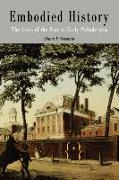- Start
- Embodied History: The Lives of the Poor in Early Philadelphia
Embodied History: The Lives of the Poor in Early Philadelphia
Angebote / Angebote:
Embodied HistoryThe Lives of the Poor in Early PhiladelphiaSimon P. NewmanWinner of the 2004 American Studies Network Book Prize"Newman has ably probed the limited representations of the bodies of the poor in the public records--glimpses of lives otherwise unrecorded--and has given us a useful and readable account of the ways in which the poor were regulated by the emergent disciplinary power of the modern state, even as some poorer individuals were able in limited ways to resist that power."--William and Mary Quarterly"A well-researched, well-written, and compelling study of citizens who have, until now, been overlooked by historians. . . . Newman vividly recreates the experiences of the impoverished men and women who found themselves in the city's almshouse, prisons, or hospitals. He also uses primary sources to explore the lives of the African Americans (many of them runaways) and sailors who, more or less, made the city their home. The work concludes with an exploration of the role death played in the lives of the urban poor. . . . Provocative and intellectually satisfying."--Choice"Nobody can give the long-dead poor a voice, but Newman has come very close indeed."--Journal of the Early Republic"Brilliantly conceived and executed. This fascinating, truly significant book is required reading for anyone interested in the early Republic and is a natural for use in both graduate and undergraduate courses."--Pennsylvania Magazine of History and Biography"Embodied History's interpretations are bold and imaginative. They ought to inspire additional investigations of the poor, their coping strategies in the lives in which they found themselves, and their own perspectives on those lives."--International Journal of Maritime HistoryOffering a new view into the lives and experiences of plebeian men and women, and a provocative exploration of the history of the body itself, Embodied History approaches the bodies of the poor in early national Philadelphia as texts to be read and interpreted. Through a close examination of accounts of the bodies that appeared in runaway advertisements and in seafaring, almshouse, prison, hospital, and burial records, Simon P. Newman uses physical details to paint an entirely different portrait of the material circumstances of the poor, examining the ways they became categorized in the emerging social hierarchy, and how they sought to resist such categorization. Simon P. Newman is Sir Denis Brogan Professor of American Studies, University of Glasgow, and author of , also available from the University of Pennsylvania Press.Early American Studies2003 | 224 pages | 6 x 9 | 14 illus.ISBN 978-0-8122-3731-3 | Cloth | $65.00s | �.50 ISBN 978-0-8122-1848-0 | Paper | $24.95s | �.50 ISBN 978-0-8122-0292-2 | Ebook | $24.95s | �.50 World Rights | American HistoryShort copy:"A useful and readable account of the ways in which the poor were regulated by the emergent disciplinary power of the modern state."--William and Mary Quarterly
Folgt in ca. 15 Arbeitstagen
